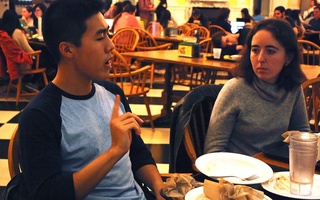Keeping up in lecture can be a difficult task, even for the best of note-takers. For Kennedy School student Gatachew Fenta and David J. Davis '87. It's an especially imposing challenge.
Both Fenta and Davis are clinically deaf.
Despite their handicap, they manage to get by--with a little help from their friends and the University.
Two University programs assist the hearing impaired, who can often keep up in lecture through sign language or lip reading. The University provides interpreters for those who rely on sign language, and student volunteers provide class notes for lip-readers who may net be able to capture more than a third of each lecture.
Fenta and Davis are among about half a dozen students who take advantage of these services.
Fenta, originally from Ethiopia, has used sign language to communicate ever since he attended Gallaudet College, a liberal arts school for the deaf in Washington D.C. Now in his second year at Harvard, he uses an interpreter, paid for by the University, in all of his classes.
Sue Motulsky, a free-lance interpreter who has worked for deaf clients throughout the Boston area, accompanies Fenta to class each day.
On Tuesdays and Thursdays, Motulsky sits beside the podium in Sever 202, silently echoing visiting professor Joseph Cooper as he lectures in Government 1300. "The National Government of the United States." Fenta sits at the front of the classroom, carefully watching his interpreter and quickly jotting down notes.
Fenta began his search for an interpreter by submitting a request to Thomas E. Crooks '49, who coordinates services for than dicapped students. He learned of the University program through a letter sent to all students who indicate serious hearing impairments in their admissions forms, housing applications, or school medical records.
Crooks forwards requests for interpreters to the Massachusetts Office on Deafness (MOD), a state agency which runs a referral service for free-lance sign language interpreters.
Carol Seidman, the director of the service, recommends several possible interpreters to the University based on preferences expressed by the deaf person. The final choice rests with the student.
The University and the interpreter then negotiate an hourly wage, which is usually between $15 and $25.
But Davis never learned sign language; instead, he was taught to read lips.
Davis says that lip reading is only partly effective. He is unable to take complete notes, so he enlists the aid of classmates who volunteer to share their notes.
At the beginning of his freshman year, Davis asked Crooks' office to arrange note-takers for two of his classes. Later, he was able to copy notes from newly made acquaintances in the classes.
Read more in News
Student Hitby Car Not Badly Hurt; Returns to ClassesRecommended Articles
-
Gaullaudet Appoints New PresidentWASHINGTON--Gallaudet University's board of trustees chose the dean of the school's college of arts and sciences to become the first
-
Short TakesCambridge Resident Arrested on Campus A Cambridge resident who had been previously warned off Harvard property was arrested on Thursday
-
Student Charges ART With DiscriminationA doctoral student at the Graduate School of Education has filed a complaint charging the American Repertory Theater (ART) with
-
Reading the SignsBy Benjamin M. Jaffe Although the acoustics in Sanders Theatre may be perfect for concerts, Sanders is not the ideal
-
 Deaf Students Utilize Resources, But Still Face Barriers
Deaf Students Utilize Resources, But Still Face Barriers













